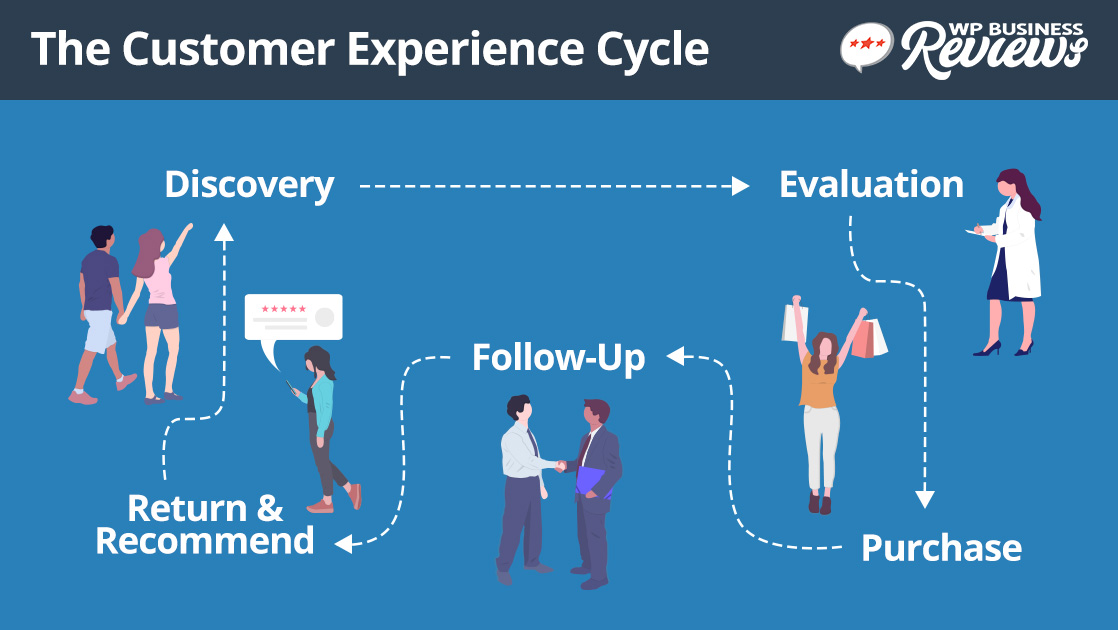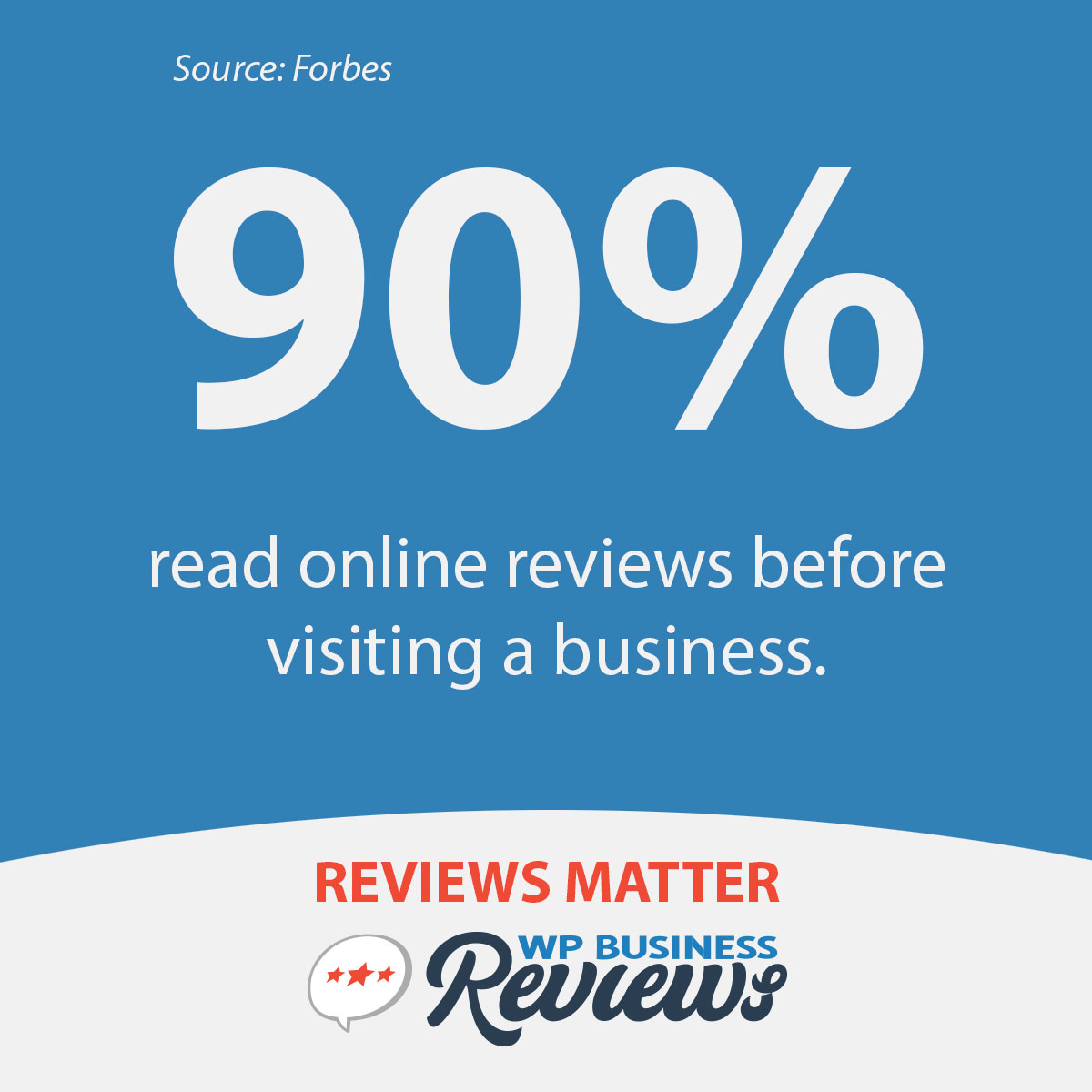Every customer’s experience matters because it affects a business in multiple ways, most directly in reviews. These reviews also affect other customer experiences from the beginning. It’s a cycle that calls for a closer examination of the relationship between reviews and customer perception.
In this article, we’ll walk through the cycle of customer experience, discuss how reviews fit in, and conclude with how to improve your overall customer experience and reviews together.
The Cycle of Customer Experience
Let’s first review the lifecycle of a customer then examine how reviews and customer experiences affect each other.
A customer’s experience with your business (hopefully) never ends. It starts when they discover you and continues in a cycle as their loyalty increases. This process is defined by 5 key stages involving multiple steps.
- Discovery: A person sees your logo, hears about you from a friend, finds you on a Google search, or sees your business as they pass by.
- Evaluation: They begin to evaluate your business based on data they gather through word of mouth, your website, and other online spaces. One of the key pieces of the evaluation process for most people is looking at reviews.
- Purchase: After evaluating, the person decides to purchase from your business or a competitor.
- Follow-Up: After their purchase, your business should follow up to ensure their experience ended on a positive note. If it didn’t, this process should include a way to rectify whatever went wrong and turn a negative experience into a positive one.
- Return & Recommend: If the customer had a great experience with your business, they are likely to return and recommend your business to others. Their recommendations may come through word of mouth or online reviews.

Your customer experiences begin when they first encounter your brand. Whether it’s an ad, a sign, or a referral from a friend, your customer begins their experience before you’ve ever made contact. Once someone has seen your brand or business in some capacity, they begin the lifecycle of a customer. Unfortunately for you, this customer doesn’t make contact with you until they’re nearly halfway through the cycle.
Before ever contacting you, most people will skip straight to the evaluation process where they analyze your website, social media pages, and/or reviews listings. What they find there will determine whether or not they choose to use your business and continue to define their experience.
How Reviews Affect Customer Experience
The evaluation process involves almost always involves looking at reviews. Most people browse online reviews before they choose to purchase.

If they didn’t find your business through an online search or by stumbling on it in person, they might also ask their friends for recommendations on Facebook. These interactions lead them to look at your Facebook page, website, etc. and from there they begin their evaluation.
Similar to the way in which customers can affect the experiences of others in person, online reviews have the same effect. Review Trackers applied research defining the scale of “Other Customer Perception” (OCP) to in-person experiences. They explain how the experiences of customers in person affect those around them.
For example, imagine a woman behind you in line is so angry about waiting that she complains loudly until you finally get to the front. That would make your experience at the business much less favorable in general. This same scale can be applied to the effect of online reviews.
When evaluating reviews, potential customers use OCP to weigh their importance. OPC is defined by a few characteristics, but among them are two that apply specifically to how people evaluate reviews:
- Similarity: How similar is the reviewer to the potential customer? There is a theory that “individuals derive the social part of their identity from membership in a social group.” So if the reviewer is similar or part of the same social group, then the potential customer might put more weight on the review.
- Suitable Behavior: From the content of the review, usually, it’s fairly easy to tell who is unreasonable and who isn’t. Did the reviewer behave correctly? If the customer displayed suitable behavior, even in their complaint, then the person evaluating the business is more inclined to believe the customer.
The factors considered in OPC have an impact on the ability of your reviews to produce a primacy effect. Primacy effect means an opinion is influenced based on information someone heard through a third party before having their own first-hand experience.
For instance, let’s say a new customer saw positive reviews before entering your business. Their first interaction is more likely to be positive. On the other hand, if they found mostly negativity online, then they’re more likely to perceive the experience as less positive than it actually was. Opinions of reviewers with more similarity who display suitable behavior will weigh more heavily during this process.
How the Customer Experience Affects Reviews
Once someone has chosen to contact you, it’s crucial that you are able to either overcome their negative first impressions or exceed their good impressions. One way to ensure a new customer’s first interaction is more favorable is to keep their experience aligned with their expectations. Engagement with your business needs to move forward with the same branding, tone, and messaging they found in the discovery and evaluation stages.
For example, if your website gives the impression of a 5-star restaurant but your atmosphere is that of a taco shop, chances are your customers will be disappointed when they walk in dressed for a night out. If your website clearly reflects your brick-and-mortar setting, then the taco shop experience will enhance the experience instead of distracting from it. Establishing clear expectations before a customer’s first contact is important to the overall customer experience.
Now that the customer is in your store, on the phone with you, or interacting in an online forum, you need to make sure your staff is on the same page. If your employees are empowered to perform their jobs well and give excellent customer service, this will reflect in your reviews. If they aren’t, it can damage your online ratings, especially if you fail to follow up.
Following up on purchases also needs to align with the previous touch-points the customer had with your business. Keep your brand, tone, and quality consistent. Furthermore, it can provide a buffer between bad service and a bad review. By following up you might get direct customer feedback and the chance to provide a solution to a customer with an issue. This chain of engagement leads to an opportunity to ask for a positive online review.
An email drip campaign is the perfect way to do this. You can find templates for email drip campaign templates suited for a variety of types of businesses, here.
Improve Your Business
Getting great reviews goes beyond marketing. Get tips on customer experience and more when you subscribe.

Improve the Customer Experience by Making Positive Reviews Easy to See
Now that you’ve identified the cyclical relationship between reviews and customer experience, you can influence it in your favor. In order to do that, you need to try to guide those evaluating your business to the reviews you want them to see.
On public forums (like social media, Google, or Yelp), you generally have little control over what is seen first. Prominently displaying and sharing your reviews helps to ensure that your visitors see the best your business has to offer right away.
Putting reviews on your website will also give you a little boost in your local SEO strategy. It enables you to rank higher in search results to encourage people to choose your website to evaluate your business rather than your Facebook or Yelp Page. If you’re not sure how you would put reviews on your website, check out one of these two articles on designing with your reviews.
- Build a Review-Rich Website That Converts
Use reviews to help you structure the website for any business. Convert website visitors into customers using strategic review placement, subject-based groupings, and more. - 7 Ways to Display Reviews on Your Website
Get a little creative with how you display your reviews. Mix it up with carousels, lists, galleries, single reviews, and more. We’ll show you how.

